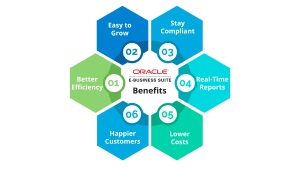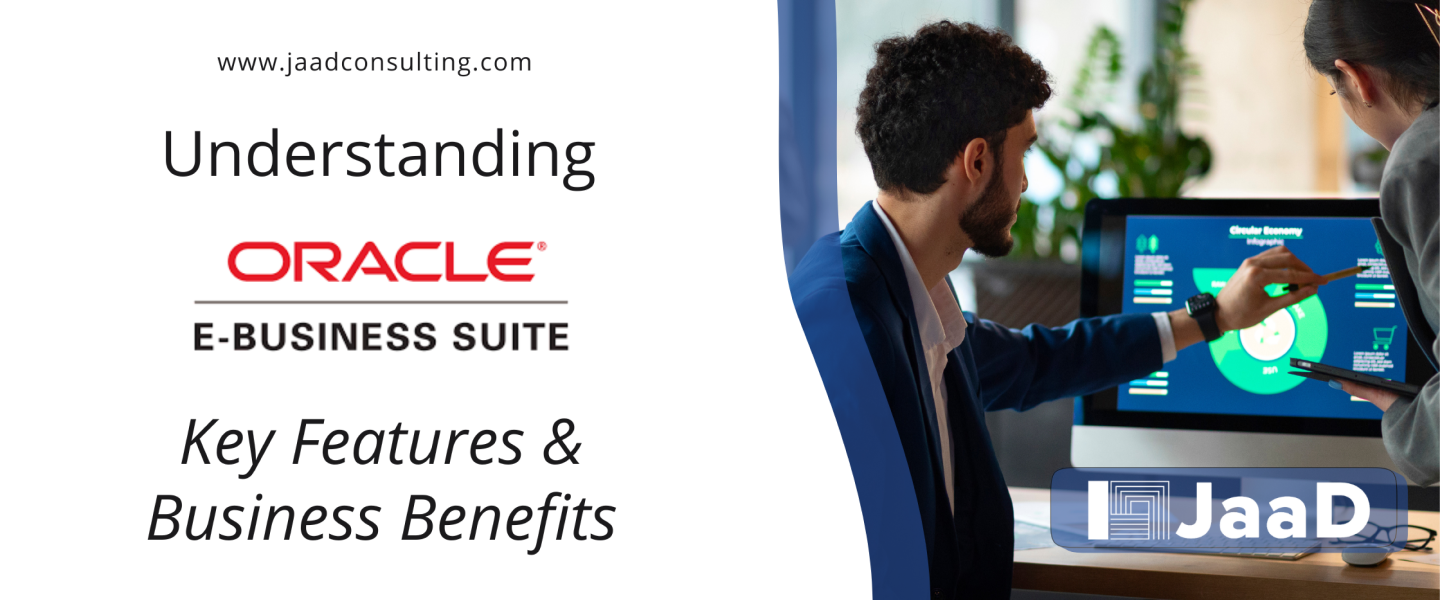Running a business involves many moving parts—finance, HR, supply chain, customer service, and more. Managing all these using different systems can be slow and confusing. That’s where Oracle E-Business Suite comes in.
Also known as Oracle EBS, this is a set of connected tools that help companies manage their work in one place. It has been around for many years and is trusted by many mid-size and large businesses. At Jaad Consultants, we help companies use Oracle ERP systems like Oracle EBS to improve how they work.
In this guide, we will walk you through everything that you need to know about Oracle EBS.
What is Oracle E-Business Suite (EBS)?
Oracle EBS is a group of software tools made by Oracle. These tools help different parts of a business work together. You can manage finances, hire people, track inventory, and serve customers, all from one system.
The best part? It’s modular. That means you can start with the tools you need now and add more later. All the tools work together and share the same data. This keeps everything connected and up to date.
How You Can Use It
Oracle EBS can run:
-
- On your own servers (on-premise)
- In the cloud, using Oracle’s servers
- In both places, called a hybrid setup
This gives companies the freedom to choose what works best for them.
Who Uses Oracle EBS?
Many industries use Oracle EBS. It works well for:
- Manufacturers
- Retail and logistics companies
- Healthcare providers
- Banks and financial firms
- Government and education departments
If your business has many teams, locations, or processes, Oracle EBS can help bring everything together.
Not sure how you can use Oracle E-Business Suite for your business? Speak to our expert consultants to see how EBS can help.
Key Oracle EBS Features
Oracle EBS features cover all major business needs. Here’s a quick look at what it includes:
Financial Management
- Track income, expenses, and cash flow
- Manage taxes, budgets, and assets
- Handle multiple currencies and countries
- Stay compliant with financial rules
Human Capital Management (HCM)
- Manage employee records and payroll
- Handle hiring, promotions, and training
- Use self-service portals for staff
- Plan workforce growth
Supply Chain Management (SCM)
- Manage orders, inventory, and deliveries
- Forecast demand and control stock
- Work with suppliers and warehouses
- Track shipments and timelines
Customer Relationship Management (CRM)
- Manage leads, sales, and support tickets
- Track marketing efforts and results
- Give customers faster service
- Keep all customer info in one place
Procurement and Manufacturing
- Manage vendors and contracts
- Plan and track production
- Monitor product quality
- Schedule and control factory work
All these tools work together. So, when you update something in one area, it reflects everywhere else automatically.
Business Benefits of Oracle EBS
Using Oracle ERP systems like Oracle EBS brings many benefits. Here are the most important ones:

Better Efficiency
Teams spend less time on manual work. Tasks move faster because the system connects everything and automates steps.
Easy to Grow
You can add new tools and users when your business grows. The system is built to handle more work without slowing down.
Stay Compliant
Oracle EBS helps you follow tax laws, labor rules, and other regulations in different countries. This is key for global businesses.
Real-Time Reports
You get up-to-date data anytime. This helps leaders make quicker and smarter decisions.
Lower Costs
By using one system instead of many, businesses save money. They also avoid errors and delays caused by switching between tools.
Happier Customers
With all customer info in one place, your team can respond faster and give better service.
At Jaad Consultants, we’ve helped many companies see these business benefits of Oracle through well-planned ERP projects.
Oracle EBS vs Other ERP Systems
You may wonder how Oracle EBS compares to other tools like SAP or Microsoft Dynamics. And why you should go with EBS and not the others.
Some of the main reason why EBS is preferred include:
- It’s stable and trusted by global businesses
- It has deep features across departments
- It works in many industries
- It offers strong customer and partner support
But there are also some things to keep in mind
- It takes time and planning to set up
- You may need expert help for custom setups
- Users will need training to learn the new system
This is where we at Jaad Consultants come in. We guide you through each step—from planning to training—so your team gets the most out of Oracle EBS.
Implementation Considerations
Setting up Oracle EBS isn’t something to rush. Here’s what to think about:
Timeline
Most companies roll it out in phases. This gives teams time to adjust and avoids business disruption.
Expert Support
Oracle EBS is powerful but complex. Working with experienced Oracle ERP consultants helps avoid mistakes and ensures smooth setup.
Training
New systems mean new ways of working. Good training helps your team feel confident and reduces pushback.
Moving to the Cloud
Already using an older version? Now may be a good time to move to the cloud. Oracle offers tools to help with that. A hybrid approach is also an option if you want to move step-by-step.
Conclusion
The Oracle E-Business Suite is a complete system that helps businesses run better. It connects departments, improves decision-making, and supports growth.
If your company is growing, has complex operations, or wants to move toward digital systems, Oracle EBS is worth considering. With the right planning and support, it can become the backbone of your business operations.
At Jaad Consultants, we help businesses make the most of their Oracle ERP investments. From setup to long-term support.
Thinking about Oracle EBS for your business? Let Jaad Consultants help. We offer custom solutions, clear guidance, and hands-on support to get you up and running.
Contact us today to learn how we can streamline your systems and set your business up for long-term success.

